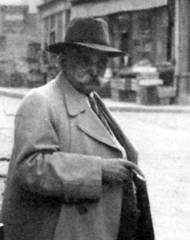Gurdjieff
International Review
Fall 2005 Issue, Vol. IX No. 1
Welcome to the Gurdjieff International Review—a source of informed essays and commentary on the life, writings, and teachings of George Ivanovitch Gurdjieff. Mr. Gurdjieff was an extraordinary man, a master in the truest sense. His teachings speak to our most essential questions: Who am I? Why am I here? What is the purpose of life, and of human life in particular? As a young man, Gurdjieff relentlessly pursued these questions and became convinced that practical answers lay within ancient traditions. Through many years of searching and practice he discovered answers and then set about putting what he had learned into a form understandable to the Western world. Gurdjieff maintained that, owing to the abnormal conditions of modern life, we no longer function in a harmonious way. He taught that in order to become harmonious, we must develop new faculties—or actualize latent potentialities—through “work on oneself.” He presented his teachings and ideas in three forms: writings, music, and movements which correspond to our intellect, emotions, and physical body.
“The Material Question”
In this, our seventeenth issue, we provide many observations by Gurdjieff and others on the subject of money. A complete printed copy of this issue can be ordered from our store.
Introduction
by James Opie
Gurdjieff said, “Weak in life, weak in the work.” But what is real strength?
Can we participate in bringing our attitudes related to money out of the shadows, into the light?
Gurdjieff and Money: Part I
by G. I. Gurdjieff
Beelzebub’s Tales to His Grandson, Meetings with Remarkable Men, and In Search of the Miraculous each contain observations and principles regarding money.
Gurdjieff and Money: Part II
by Gurdjieff’s Pupils
Several pupils recorded how Gurdjieff used experiences related to money to teach.
Our Money Has No Value
by René Daumal
In his unfinished novel, Mount Analogue, René Daumal challenges the reader to question what might constitute a trading currency when pursuing esoteric knowledge. His characters discover that “the peradam is the only substance, the only material object whose value is recognized by the guides of Mount Analogue.”
The Same Old Trick
by Jean Toomer
A writer and early leader of groups, Jean Toomer was also among the first American “sheep” that Gurdjieff actively “sheared.” Toomer wrote that Gurdjieff used money as a “lever with which to work on you—one of the few and most effective ready-made levers available to him.”
Religion and Money
by John Pentland
Shared publicly for the first time, this essay by Lord (John) Pentland records his reflections on the topic of money in relation to religion.
Money and the Meaning of Life
by Jacob Needleman
In his book of the same title, Dr. Needleman elaborates on how “we cannot see the real world because we are not in contact with the deeper powers of thought and sensing within ourselves that could perceive it. Because of this, it is inevitable that we experience the external world as the strongest force in our lives. This is the meaning and origin of materialism.”
Children and Money
by Lillian Firestone
Lillian Firestone describes work with children as part of the Gurdjieff Foundation’s program in New York. “The Children’s Team, as it was called, provided opportunities for self-study for adults and children alike.”
Eight Silver Dollars
by Patty de Llosa
Patty de Llosa describes a decision she had to make when, as a small child, she was offered a gift from Mr. Gurdjieff.
“The Material Question” in Afghanistan, 1977
by James Opie
In the fall of 1977, the author’s import business took him to Afghanistan at the time when Meetings with Remarkable Men was being filmed there. In the course of buying merchandise in several Afghan cities, events led to an encounter with Jeanne de Salzmann on a set of the film.
Twelve Dollars
by James Opie
Face-to-face, it was easy to say “yes” to a suggestion of Lord Pentland. Then it got harder.
About This Publication
The Gurdjieff International Review is published by Gurdjieff Electronic Publishing. Any information or opinions expressed herein do not necessarily reflect the views of the publisher or editors.

“Nothing shows up people so much as their attitude toward money.”
G. I. Gurdjieff
“Man never on any account wants to pay for anything; and above all he does not want to pay for what is most important for him.”
G. I. Gurdjieff
“One finds [on Mount Analogue], very rarely in the low lying areas, more frequently as one goes farther up, a clear and extremely hard stone that is spherical and varies in size—a kind of crystal, but a curved crystal, something extraordinary and unknown on the rest of the planet.”
René Daumal
“More and more, all over the world, responsible questions about money, such as how much does one actually need, how much is enough for a given purpose, are disappearing from view. Simply to get more money is becoming a force, the action of which no one can easily deny, however ineffective he may be as a money-maker”
Lord Pentland
“The first practical step that an individual can take to free himself from the thrall of money is not to turn away from it, but to take it even more seriously, to study himself in the very midst of the world of money, but to study himself with such diligence and concern that the very act of self-study becomes as vivid and intense as the desires and fears he is studying.”
Jacob Needleman
“Gurdjieff added that observation showed that people who were weak in life proved themselves weak in the work.”
P. D. Ouspensky
Copyright © 2005
December 1, 2005
Gurdjieff Electronic Publishing